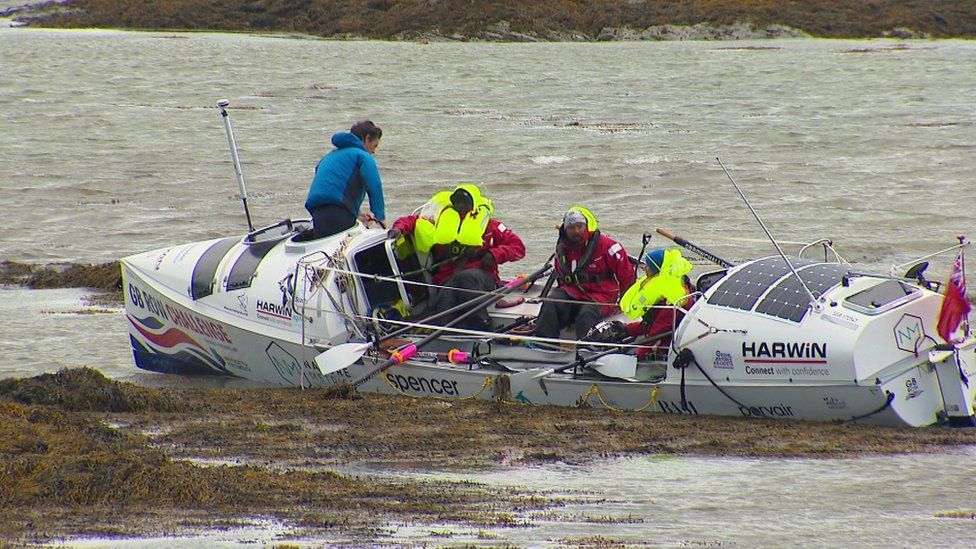GB Row Challenge: Sixteen rescued after hitting bad weather
- Published

Three crews taking part in a Great Britain rowing challenge have been rescued near Northern Ireland and Wales, following bad weather.
A rowing vessel with five people on board was rescued from the Irish Sea on Sunday morning.
It followed a six-strong crew being rescued off the Antrim coast by the coastguard on Saturday evening.
Another vessel taking part in the same challenge also had to be rescued off the coast of Wales.
All 16 rowers from the three vessels were reported to be safe and well.
The vessels from the GB Row Challenge had left London Tower Bridge on 12 June to circumnavigate Great Britain and to collect environmental data in a project with the University of Portsmouth.
At 07:00 BST on Sunday, a rowing crew reported they had "capsized and righted themselves, but were unable to row".
They had been monitored throughout the night by HM Coastguard with frequent radio transmissions.
The crew were about 23 nautical miles north east of Ardglass, County Down, and were taken to the village where they were met by Newcastle Coastguard Rescue Team.
Jason McKinlay, who was part of the Team Sea Legs crew whose vessel was towed in to Ardglass, said the conditions were "genuinely dangerous" and the Coastguard made the right decision to rescue them.
"In all honesty, we may be smiling and grinning and bearing it, that's because we are safe and on land now, but obviously you think of the kids when you go and take on these challenges," he told BBC News NI.
The rower, whose children are aged nine and 12, said it was "genuinely dangerous out there once we were underwater" and that it was only because the boat was efficient in self-righting that "we are all safe and sound".
Emma Wolstenholme, another member of the crew, said they had been battling for the last three days with "increasingly strong winds".
"We knew that it was going to be 30 knots of wind, it just increased to 40, which meant bigger waves, really steep, and we were just battling with the elements and trying to keep the boat upright," she added.
"We did have one full capsize.
"As soon as we capsized and we got onboard, I spoke to Sophie who was on the cabin and said 'please get on the radio, talk to the Coastguard tell them what has happened'.
"It was just giving them a heads up, in the end they overrode our decision to continue and they sent out a boat to tow us in."
Ms Wolstenholme said they would monitor the weather, and liaise with GB Row Challenge, but that the team were "still of that mindset" to continue in the event if possible.
"We want to get to the finish line," she added.
Tony Watson, of HM Newcastle Coastguard, said the conditions on sea this weekend had been "particularly rough" and that the incident highlighted how "even the most experienced and well-prepared sea farers can get into difficulty in such weather".
Two other crews rescued
It came after the six crew members of the GB Endurance team ran into trouble due to bad weather off the County Antrim coast of Northern Ireland on Saturday afternoon.
The team were rescued by the Red Bay RNLI lifeboat and a coastguard helicopter from Prestwick in Scotland was also deployed.
The rowers were able to board the lifeboat shortly after 23:00 and no one required hospital treatment.
Watch: Rowers rescued after hitting bad weather on Irish Sea
There were gale force eight winds with rough seas, according to the coastguard.
Another vessel taking part in the same challenge also had to be towed back to land after sustaining damage to it rudder at about midnight on Friday.
It was towed to Milford Haven in Wales after making the decision to head to Wexford in the Republic of Ireland as they were "fatigued" and concerned about worsening weather conditions.
Due to the offshore location and delicacy needed in the towing, the lifeboat was out for nearly 12 hours, arriving with the rowers and their vessel just before 12:30 BST on Saturday.
The rowers did not need medical assistance.
Alex Smith, commander at HM Coastguard, said that although all the rowers were prepared with all the appropriate safety equipment they still got "caught out".
"Whether you are rowing across the sea, sailing along the coast or going out for a paddle, always be prepared, check the weather, take the appropriate safety equipment and means of calling for help.
"Always tell someone where you are going and when you plan to come back."
Related Topics
- Published26 June 2022
- Published11 June 2022